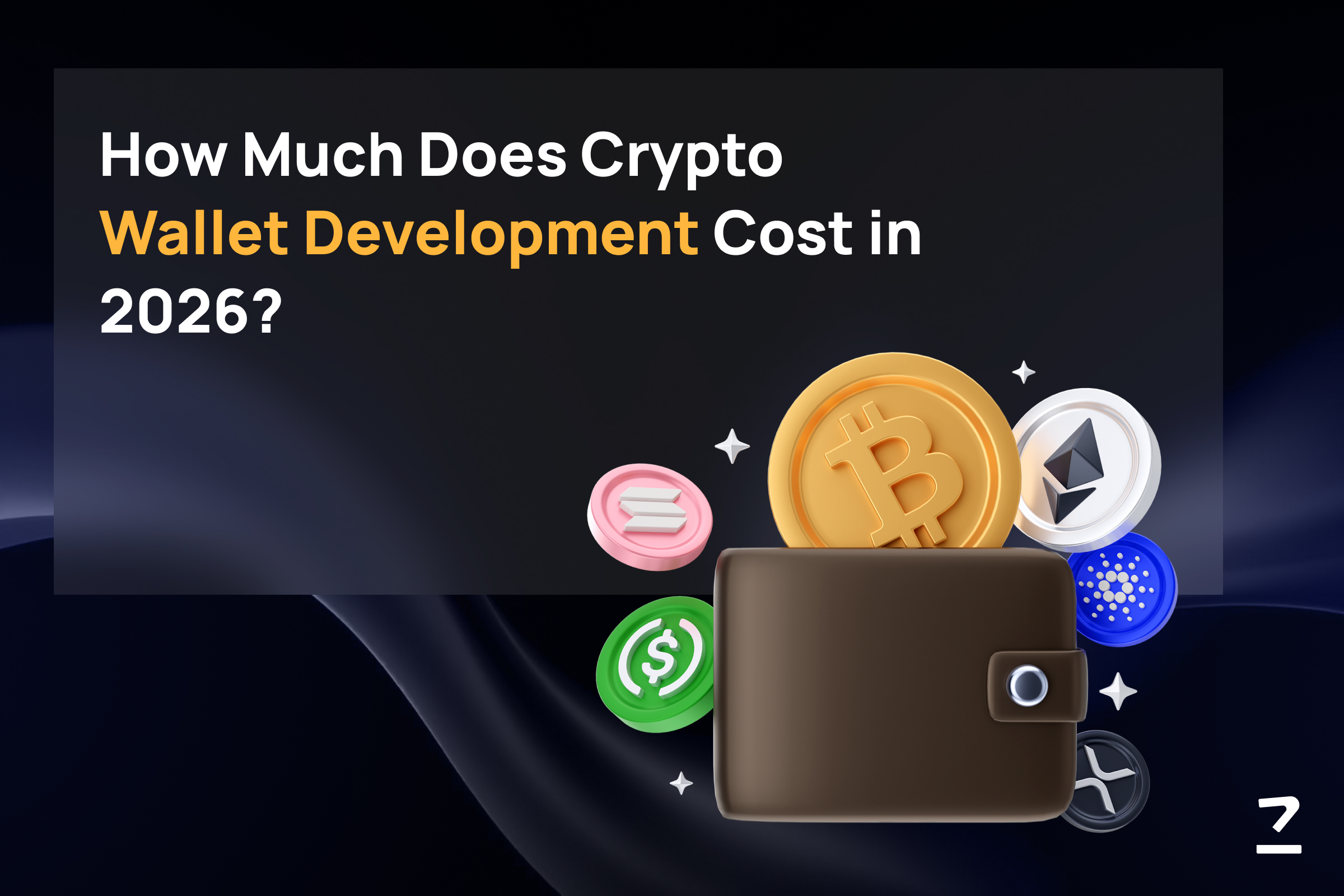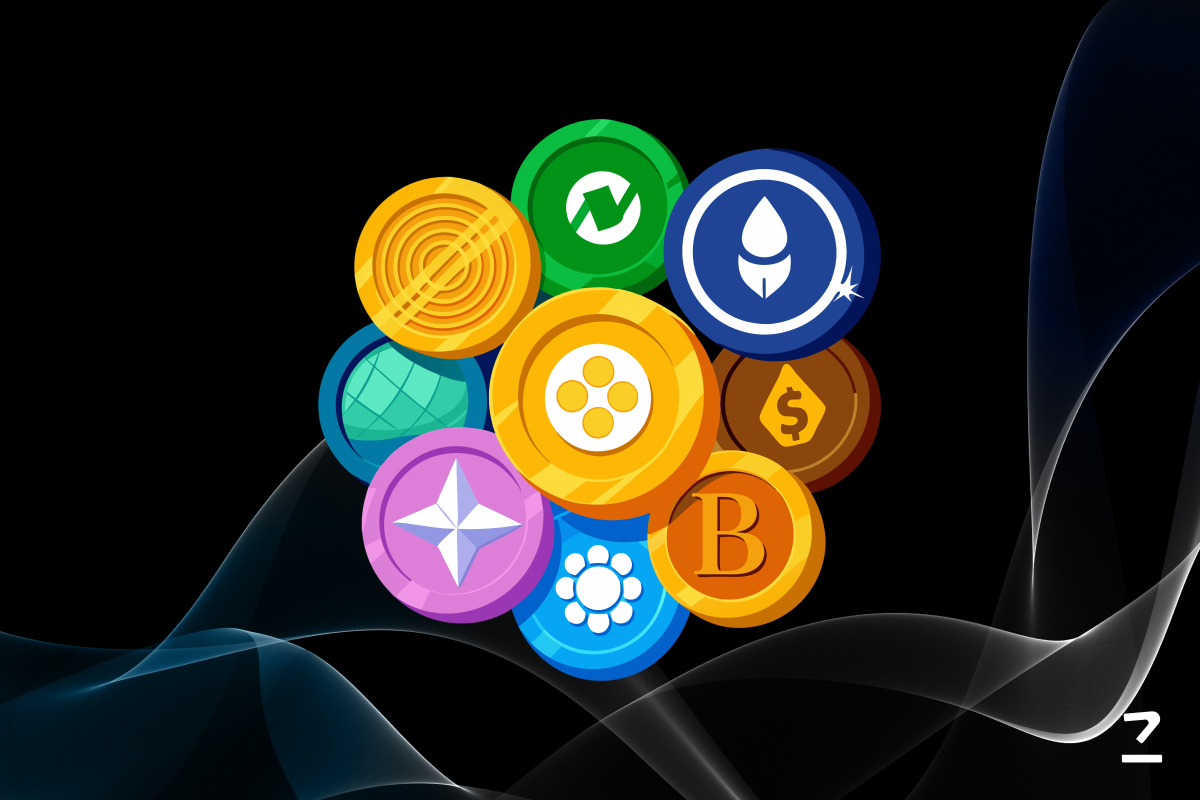SHARE THIS ARTICLE
AI-Powered Oracles: How Generative AI is Enhancing Blockchain Data Feeds
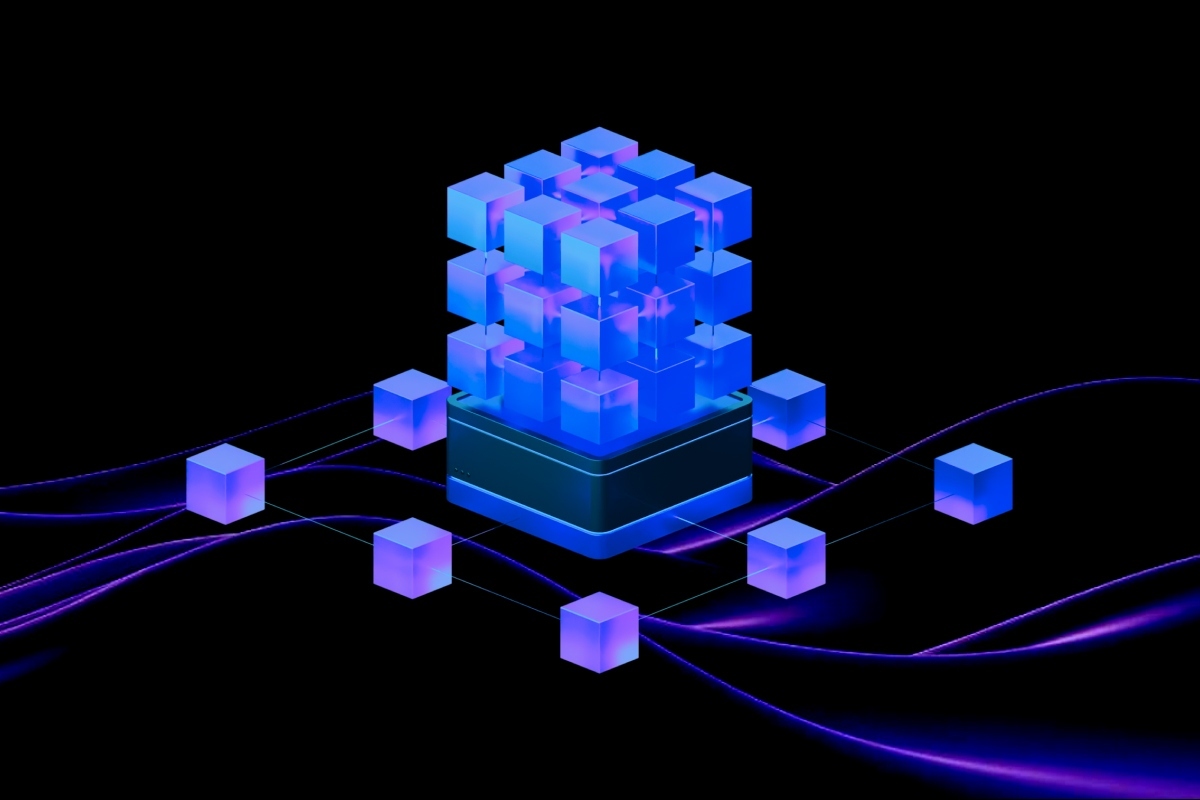
Oracles are what help blockchains talk to the outside world. Smart contracts, on their own, can’t access real-world data—so oracles step in to feed them what they need. Token prices, weather, events, game scores—you name it.
Now, with AI coming into the picture, oracles are getting a major upgrade. Instead of just pulling data from fixed sources, AI-powered oracles can check if the data makes sense, spot patterns, and even catch unusual behavior. They're more aware of context, and that makes a big difference.
The real game-changer here is generative AI. Unlike regular AI models that just follow a script, generative AI can actually work with incomplete or uncertain data and still give useful output. This opens up new ways to build smarter, more reliable blockchain oracles.
In this blog, we’ll walk through how AI and oracles are coming together, why it matters, how it works, and what it means for blockchain projects moving forward.
The Role of Oracles in Blockchain Ecosystems
Blockchains are great at keeping things secure and tamper-proof. But they’re closed systems. That means smart contracts running on them can’t access real-world data on their own. To do anything useful—like settling a bet based on a football score or triggering a payment when a shipment is delivered—they need outside info. That’s where blockchain oracles come in.
Oracles act like messengers. They pull data from outside the blockchain and pass it into smart contracts. This process is known as smart contract data integration, and it's what allows blockchains to interact with real-world events in real time.
There are different types of oracles depending on how they work:
-
Software oracles fetch data from online sources like APIs, websites, or databases.
-
Hardware oracles gather data from physical devices like sensors, barcode scanners, or IoT tools.
-
Inbound oracles bring information into the blockchain.
-
Outbound oracles send data from the blockchain to outside systems.
-
Consensus-based oracles collect inputs from multiple sources and use a majority or algorithm to decide which value is valid.
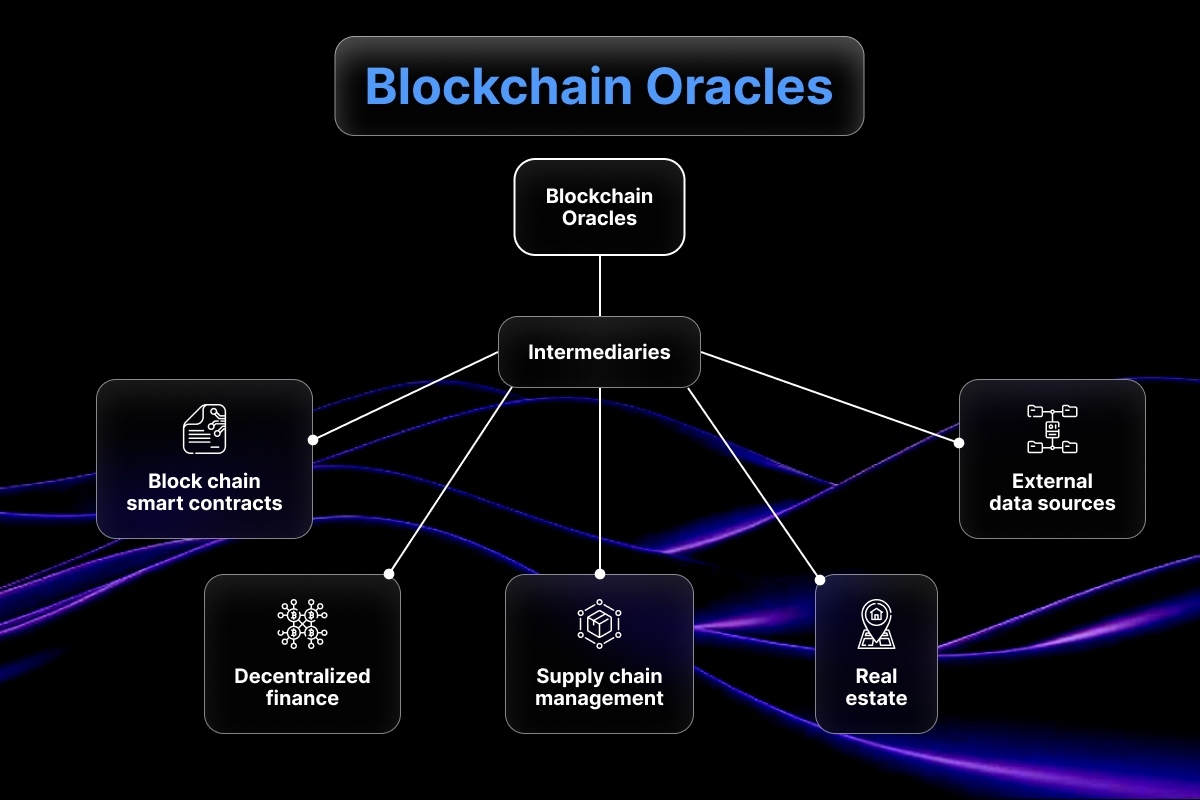
While oracles are essential, traditional ones still come with some baggage. Trust is a big issue; users have to rely on the data source and the middleman that’s bringing it in. If either one fails or gets compromised, the smart contract could act on wrong information. Speed is another challenge. Some oracles can't deliver real-time blockchain data, and delays can affect trading, payouts, or anything time-sensitive. And then there’s accuracy—data errors, outdated info, or source manipulation can all lead to bad results.
This is exactly why the idea of smarter, AI-powered oracles is picking up. And we’ll get into that next.
Generative AI Meets Blockchain
Generative AI is a type of artificial intelligence that doesn’t just process data—it creates it. It can write text, generate images, fill in missing pieces of data, and even suggest actions based on patterns it’s learned. What makes it powerful is its ability to handle uncertainty and come up with useful output in situations where traditional systems might freeze or fail.
In the context of blockchain, this matters. Blockchain systems deal with a wide range of fast-changing information. Markets shift, prices move, and user behavior varies by the second. To keep up, on-chain systems need data that’s not only accurate but also ready when it’s needed. That’s where generative AI in blockchain starts to show real promise.
These AI models don’t just pull in outside data. They can check it against patterns, validate whether it makes sense, and even fill gaps if a data source is slow or missing. Instead of relying on one fixed feed, AI-driven blockchain solutions can pull from multiple sources, weigh their reliability, and decide what the AI-driven blockchain solutions smart contract should do based on that.
When you combine the transparency of blockchain with the adaptability of AI, you get systems that are more responsive and better suited for real-time environments. That kind of AI and blockchain integration isn’t just nice to have—it’s becoming necessary as more apps demand reliable, up-to-the-second inputs.

How AI Is Enhancing Blockchain Data Feeds
For any smart contract to work properly, the data it receives needs to be solid, accurate, timely, and relevant. But with so many external sources in play, keeping that level of quality across the board is tough. That’s where AI steps in to tighten things up.
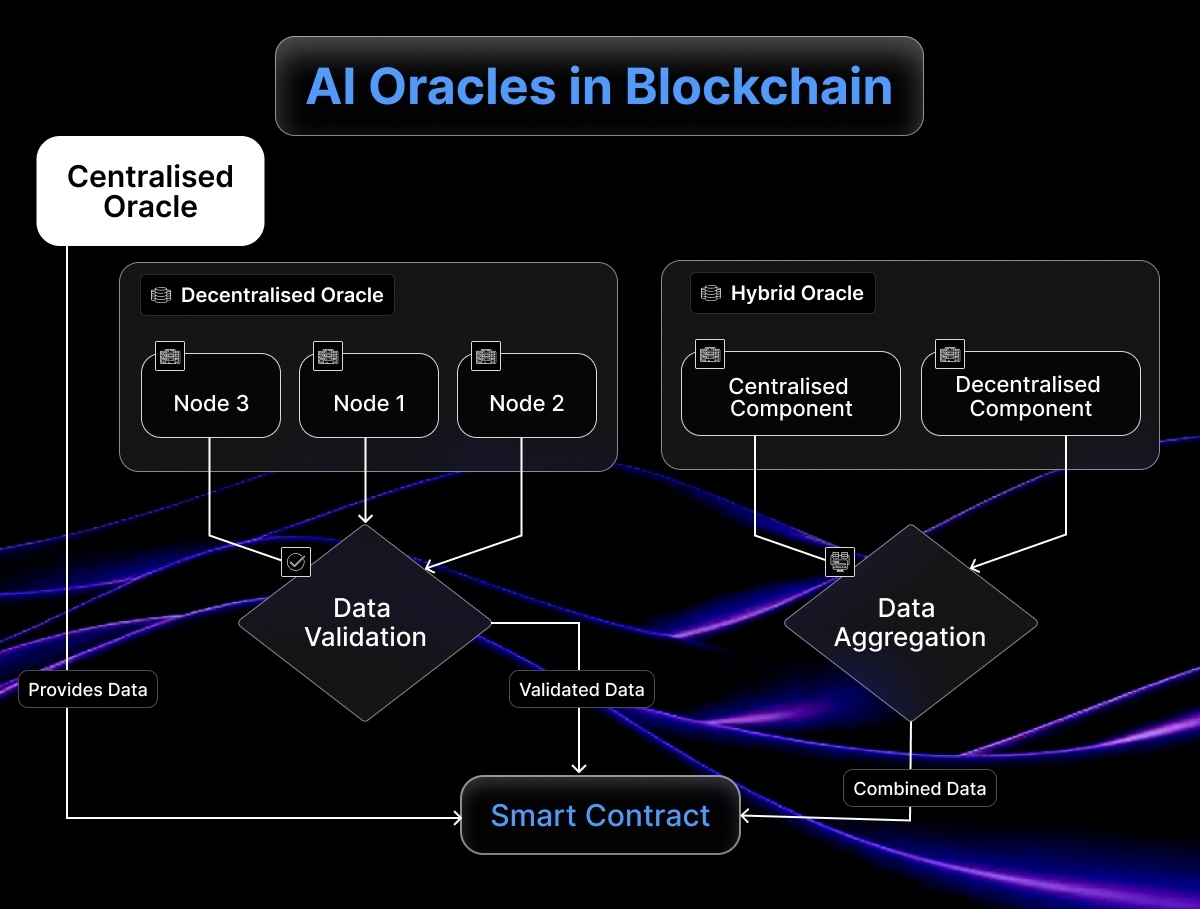
By adding intelligence to blockchain data feeds, AI models can spot inconsistencies, filter out noise, and flag questionable inputs. This helps improve blockchain data accuracy without needing manual checks. Instead of blindly trusting the first data point that comes in, the system can compare multiple sources, spot outliers, and decide what’s most likely to be correct.
Another big advantage is speed. With AI handling the process, real-time blockchain data becomes more practical. It can quickly validate incoming data, apply logic, and feed it straight into the smart contract—all without human input. This makes the system more reliable, especially in fast-paced environments.
There are plenty of real-world use cases where this is already useful:
-
Finance: Price feeds for crypto or stocks can be verified and updated in real time to avoid issues like front-running or manipulation.
-
Gaming: In-game actions or results that depend on outside data (like leaderboards or real-world events) can be tracked more accurately.
-
Supply chain: Sensor data from shipments or inventory can be checked and verified automatically before triggering actions on-chain.
-
Insurance: Claims can be processed faster when verified weather data, accident reports, or medical logs are pulled and reviewed by AI.
The result is a smoother flow of data that smart contracts can actually rely on, without the delays or risks that come with manual or outdated inputs.
Benefits of AI-Powered Oracles in Smart Contracts
Smart contracts are only as good as the data they run on. If that data is late, wrong, or incomplete, the whole process breaks. This is where AI oracles in smart contracts start to make a real impact.
First, they bring speed. AI models can process large volumes of data almost instantly. Whether it’s a price feed, a weather update, or a live game score, the contract gets what it needs without delays. That kind of responsiveness isn’t just convenient—it’s critical for apps that rely on real-time decisions.
Second, they reduce the need for human oversight. With AI handling the validation and logic, there’s less room for manual error or interference. And that lines up well with the whole idea of decentralization. Fewer middlemen. More trust in the code.
Another big plus? Adaptability. These oracles can learn from new data over time. So as protocols evolve or new data sources come into play, the system can adjust without needing to be rebuilt from scratch. That makes enhancing smart contracts with AI oracles a long-term move, not just a one-time upgrade.
A few example use cases:
-
In DeFi, AI oracles can detect sudden price swings across multiple exchanges and protect protocols from flash loan attacks.
-
In insurance, a smart contract can process a flight delay claim automatically using verified flight data checked by AI.
-
In prediction markets, AI can pull results from multiple sources, filter out noise, and confirm outcomes with high accuracy.
-
In logistics, delivery confirmation from IoT devices can trigger payouts, only after AI checks for signs of tampering or delays.
All of this makes smart contracts smarter—more accurate, more responsive, and more dependable.
Implementation Challenges and Considerations
While AI-powered oracles sound promising, building them isn’t always straightforward. There are a few things to think through before diving into development.
The first challenge is data source trust. Even the smartest AI can only work with the data it receives. If the source is unreliable or manipulated, the results will be flawed. Blockchain data verification becomes critical here. You need a system that can compare multiple inputs, check for patterns, and flag anything that doesn’t add up.
Next is the question of model accuracy. AI systems are trained on data. If that training data is incomplete or biased, the outputs can also be off. This can lead to bad decisions by smart contracts. Regular testing and updates are necessary to keep models in check and performing well.
There’s also the matter of infrastructure. Running advanced AI models alongside blockchain systems takes compute power, storage, and proper architecture. This adds to the complexity. It also brings up cost. Some businesses may need help from teams that offer oracle development and implementation services to get things right without overbuilding.
Regulatory concerns might come into play too. In certain sectors like finance or healthcare, how data is collected, processed, and used matters from a compliance standpoint. Using AI means adding another layer that needs to be audited and understood.
The takeaway here is simple. While AI oracles offer real benefits, they need careful planning, testing, and maintenance. Rushing into implementation without a clear strategy can cause more problems than they solve.
Oracle Development Services and Best Practices
For businesses looking to build smarter, more flexible blockchain systems, AI-powered oracles are starting to look like a solid next step. But bringing them into a project takes some planning.
There are two main routes to consider. Some teams choose to build custom oracles from scratch. This gives full control over how data is collected, verified, and fed into smart contracts. Others choose to integrate with existing oracle networks that now offer AI-driven features. While that approach saves time, it may come with trade-offs in terms of customization and data transparency.
Either way, working with the right tech partner makes all the difference. A team with strong experience in oracle blockchain development can help set up the architecture, choose reliable data sources, and make sure the AI layer is doing its job properly. At Codezeros, we help businesses design, develop, and deploy AI-integrated oracles that match their specific needs. Whether it’s part of a DeFi platform, a supply chain system, or a real-time analytics tool, we make sure the integration holds up under pressure.
When it comes to oracle development and implementation services, there are a few best practices that matter:
-
Test with real and simulated data to catch edge cases early
-
Use multiple data sources to reduce single-point failure
-
Monitor model performance regularly and retrain as needed
-
Keep the system modular so it can evolve without full rebuilds
-
Plan for scalability from day one to avoid costly rewrites later
Strong oracles aren’t just about writing smart contracts—they’re about building smart systems. And that starts with clean data, solid infrastructure, and the right development support.
The Rise of AI-Powered Oracles in Web3
The demand for smarter oracles is only going to grow as Web3 apps get more complex. DeFi protocols, NFT platforms, prediction markets, and on-chain games all rely on external data in one form or another. And that data needs to be fast, accurate, and reliable. This is where AI in decentralized finance and dApps starts playing a bigger role.
We’re already seeing projects explore ways to go beyond basic data feeds. One direction involves combining AI-powered oracles with privacy tech like zero-knowledge proofs (ZKPs) and multi-party computation (MPC). This lets apps use sensitive data—like financial records or identity info—without exposing the raw inputs. The oracle can prove that the data meets certain conditions without showing the full details.
Another trend to watch is the rise of AI agents that interact directly with smart contracts. These agents can monitor blockchain activity, trigger transactions, and manage assets based on external events. They can also negotiate, adapt, and learn from outcomes over time. In some cases, they might even help smart contracts rewrite or adjust their own rules, without needing to redeploy the contract.
All of this points to a bigger shift in how generative AI in decentralized data feeds will be used. We’re moving from oracles that simply report data to systems that understand, validate, and even act on it. For projects building in Web3, that opens up new ways to create more responsive and intelligent on-chain experiences.
Why Choose Codezeros for Oracle Blockchain Development
If you’re planning to integrate AI-powered oracles into your blockchain project, working with the right development team matters. At Codezeros, we bring deep expertise in both AI systems and blockchain architecture—two areas that need to work together for oracles to function well.
Our team offers custom oracle development solutions built to handle real-time data, multi-source validation, and adaptive AI models. Whether you need a lightweight data feed for a DeFi app or a complex system with machine learning and smart contract triggers, we help design and implement it the right way.
We’ve worked with projects across finance, gaming, logistics, and more—helping them build smarter contracts backed by reliable, verified data. And we don’t just stop at launch. We help with testing, scaling, and maintaining your oracle system over time.
Looking to bring AI and blockchain together in a way that actually works?
Get in touch with Codezeros for a consultation on oracle development and implementation services.
Conclusion
AI-powered oracles are changing the way smart contracts interact with the world. By bringing in context-aware, real-time data, they solve many of the issues traditional blockchain oracles struggle with—like delays, errors, and rigid data feeds.
With generative AI, these oracles can go a step further. They don’t just fetch data—they understand it, check it, and even adapt to new patterns. That makes them a smart fit for DeFi, supply chain, insurance, gaming, and any use case where data accuracy and timing matter.
The best part? This space is still growing. Teams that get in early and build with AI in mind will have a head start as demand increases. And with the right development support, getting started doesn’t have to be complicated.
If you're exploring advanced oracle systems or looking to upgrade your smart contract infrastructure, Codezeros offers blockchain development services that can help. From concept to deployment, we build reliable oracle solutions that work with your goals.
Reach out to Codezeros to learn more about building AI-integrated systems for your next Web3 project.
Post Author
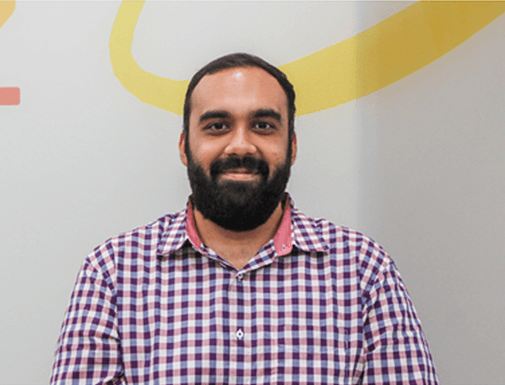
As a distinguished blockchain expert at Codezeros, Paritosh contributes to the company's growth by leveraging his expertise in the field. His forward-thinking mindset and deep industry knowledge position Codezeros at the forefront of blockchain advancements.
Partner with Codezeros to implement generative AI in custom oracle development.
From technical architecture to smart contract integration, we offer full-stack blockchain development services that help Web3 projects tap into accurate, self-adaptive, AI-powered oracles for long-term data consistency and smarter automation.


